My work for the past decade as a writer and a scholar has been to learn with and from water — to follow what rivers and watersheds teach us. I love the Bow River, the Fraser River, the Peace River, the Columbia River, the Pacific Ocean, the Arctic Ocean, and all the watersheds that British Columbia and Alberta are part of.
How do I express this love?
On Aug. 24, 2018, while B.C. was in a state of emergency because of record-breaking wildfires caused by climate change, I sang, prayed, and sat in ceremony for about half an hour in front of the Trans Mountain pipeline project’s Westridge Marine Terminal. For this act of opposition to fossil fuel expansion that no one can afford, on Aug. 16, 2019, I was sentenced to 28 days in prison by Judge Kenneth Affleck in the B.C. Supreme Court, as recommended by the Province of B.C.’s Crown Prosecutor Monte Rattan.
After I left the courtroom, I was handcuffed, shackled, and transported in a chilly van with fellow political prisoner Will Offley. He, like me, had argued in our defence that our actions were motivated by necessity due to climate crisis. As I wrote in my sentencing statement, since the federal government has abdicated its responsibility to protect us despite full knowledge of this emergency, it became necessary to act. Our arguments were rejected by Judge Affleck.
Will was incarcerated at North Fraser Pretrial Centre while I was moved into an overly warm vehicle that ended up in the Alouette Correctional Centre for Women in Maple Ridge. The combination of heat and sliding around on the metal seat gave me motion sickness, so I’d vomited by the time I arrived at the prison.
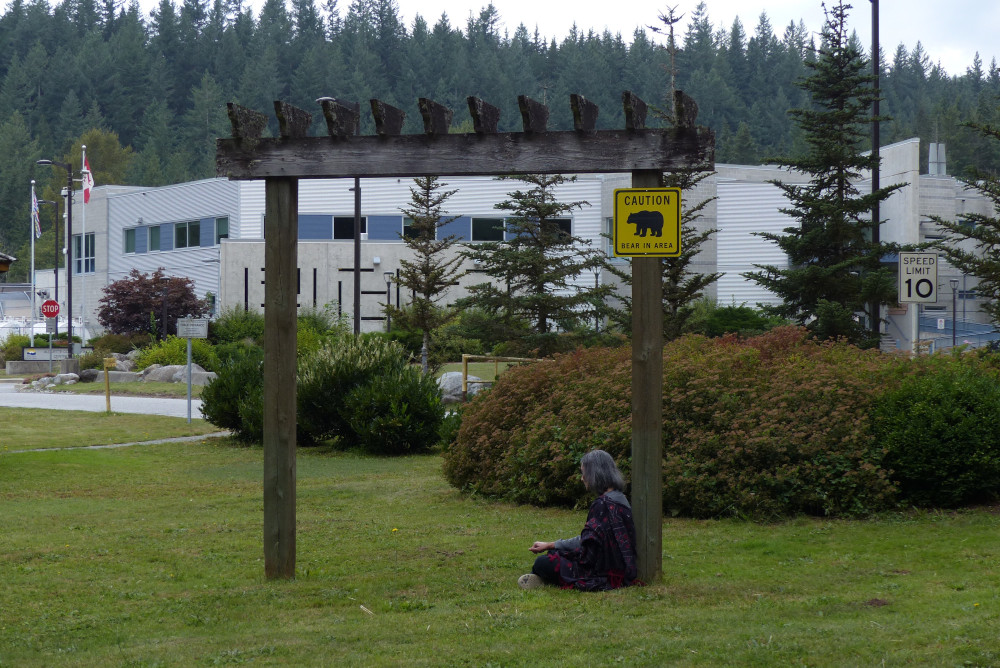
I was born on Treaty 7 territory in what is also known as Calgary and spent half my life there before moving to the unceded Coast Salish lands known as Vancouver. I love both places. I oppose pipeline expansion because I love the land known as Alberta, and see the urgent need to make a transition off fossil fuels.
I feel that the best way to repay my debt to the people who built the oil industry is not to automatically assume that oil is the only way Alberta can survive, but to lovingly assert that there are at least two things more important than oil: water, and life itself. As former Lieutenant-Governor of Alberta, Grant MacEwan, pointed out in his last book, Watershed: Reflections on Water, 75 per cent of the water in the Bow and Elbow Rivers comes from snow melt. When we accelerate that melting beyond a certain rate, we are guaranteed to melt the ice caps. Surely we are smarter and better than this.
This is why, since March 2018, I’ve spent a great deal of time up at Burnaby Mountain. I believe that everyone who lives on unceded Coast Salish lands has a responsibility to uphold Coast Salish laws, which entail respecting and protecting the land that gives us life. This is why I was arrested and sentenced to time in prison.
My first night at ACCW was spent in maximum security. My cell (Charlie 9) had a bulletin board, on which a previous prisoner had left words: COURAGE & SERENITY. The lights never went off completely in my cell. I threw a sweatshirt over my eyes and slept from sheer exhaustion after writing a letter to friends and watching a bit of APTN on the television. It was a surprise and a pleasure to see Sharon McIvor on TV, talking about the regaining of status for Indigenous women who’d had it taken away by colonial legislative violence. In the morning, I was moved to medium security after breakfast. Though my stay in maximum security was short, I was treated kindly by my fellow inmates, one of whom gifted me a hair tie and another who showed me how the phone system worked.
In medium security, Birch A5, I had a cellmate, who showed me the ropes around the prison and even made us prison candy, a confection melted from creamer, sugar and peanut butter packets salvaged from the dining hall. Many of the women I met were struggling through various experiences of addiction, trauma and poverty. Prison is not the best place to address these problems.
More programs are needed to support healing and empowerment of inmates. Systemic discrimination results in the over-representation of Indigenous women and low-income women being incarcerated. One woman was a survivor of residential school abuse, another had been attacked on the Highway of Tears as a young teenager, another was four months pregnant and constantly hungry because the meal portions in prison were inadequate for someone who is eating for two. In the spirit of sharing whatever gifts I could, I facilitated a creative writing workshop while I was in prison, for the women there have powerful voices, stories that need to be shared.
I had the opportunity to work outside, tending the prison’s grounds, pruning trees, and so forth. As I did, I kept thinking: Imagine what we could do if we diverted fossil fuel subsidies — and billions wasted on destroying forests through disasters like the Site C dam — towards regenerating forests and the carbon sinks we need to cool this earth? What if we invested in local food security, regenerative agriculture, and diversifying genuinely renewable energy? Though our systems are currently failing us, I believe that the transformations we need are possible.
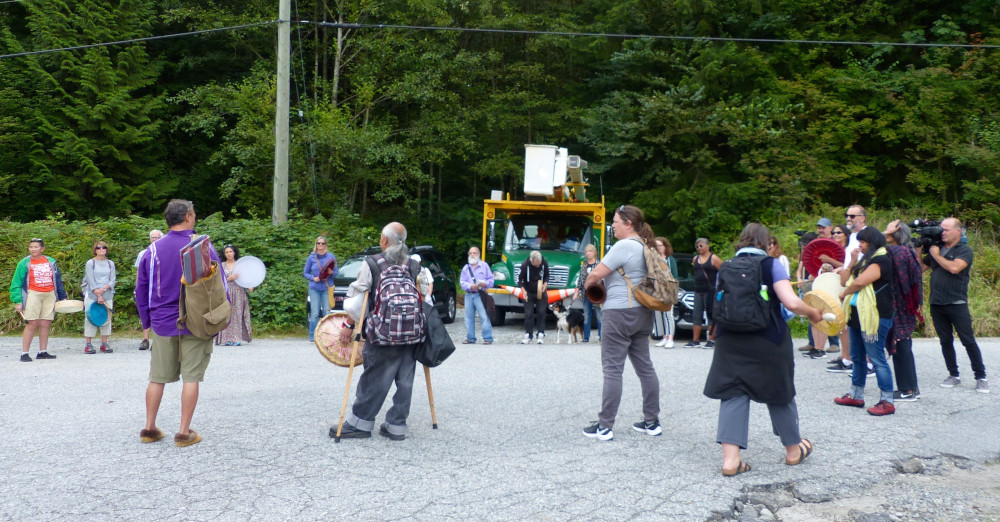
Prison was hard but bearable, and actually very educational in terms of how people navigate systemic violence by helping each other get through these systems together with compassion and kindness in all kinds of small and big ways, notwithstanding personal and interpersonal dramas that come and go.
Many of the prisoners were hungry much of the time. Some women who didn’t need as much food shared what they could with others who felt hungry, possibly because of the meds they were on to treat their addictions. The dining hall served food ranging from bologna sandwiches to chicken to hot dogs, and, for breakfast, toast, muffins and porridge. Prisoners can supplement dining hall meals with food purchased from the canteen. For a while, we could eat vegetables from the prison garden, though that privilege was arbitrarily withdrawn.
Note, however, prisoners who work are paid a starting wage of about $2 a day, and you cannot buy very much for that. I was fortunate to have funds so that I could buy rice, cheese, popcorn, and junk food that I shared as much as I could, on the instructions of friends who put funds into my account. But if I’d relied only on the $20 that I made for working 10 days on horticulture in prison, I would not have been able to buy much. Indeed, I spent half of that $20 on a $10 yoga mat that I passed onto another prisoner when I left ACCW.
I had the privilege of being as well prepared as one might be for going to prison — I’d visited prisons as a volunteer for many years as part of Joint Effort and Direct Action Against Refugee Exploitation. I also had information from previous prisoners who’d spent time at ACCW for their principled opposition to this pipeline expansion, women like long-time social justice activist Jean Swanson, now a Vancouver city councillor. This helped me imagine what to expect and how to prepare for incarceration.
I wish I could be as well prepared for climate crisis. I’m not, though I’m trying my best to get prepared. For starters, I got arrested because we’re in a climate emergency. We are in imminent peril if we consider the rate of change we are currently experiencing from a geological perspective. We are losing species at an alarming rate and facing mass extinction due to the climate crisis that humans have caused. This is the irreparable harm I sought to prevent, which the court, the Crown, and corporations also have a responsibility to prevent.
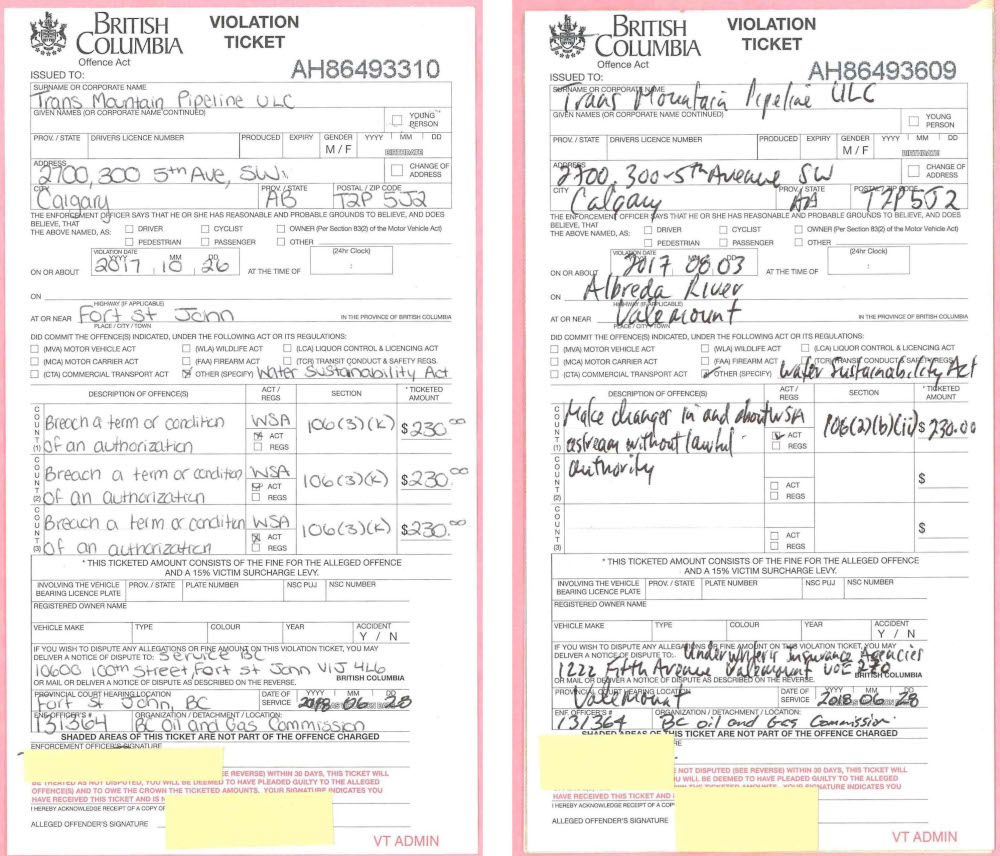
The court’s and the Crown’s failure to prevent climate crisis is made clear by contrasting my four-week prison sentence with the few pitiful fines paid for the Trans Mountain pipeline that has had so much larger an impact on the land than my small action by the Westridge Marine Terminal. Pictured above are a couple of tickets I found online that were issued in Valemount and Fort St. John by the BC Oil and Gas Commission, a slap on the wrist for the scale of work they’re doing.
It feels like no one in any official capacity is effectively monitoring the criminal damage that the Trans Mountain pipeline has inflicted as its contractors cut down countless trees and destroy wildlife habitat. Meanwhile, concerned citizens who try to protect water and land are over-policed. This disproportionate enforcement against individuals trying to prevent harm while turning a blind eye to corporations harming the land and water is systemic injustice.
Governments and systems that should be enforcing environmental protections laws are failing us, and when I and other land and water protectors point this out, they penalize and scapegoat us instead of addressing how broken and ineffectual these systems are. It’s surprising to find myself in the unexpected position of having spent time in a Canadian prison as a political prisoner, punished by the petro-state for asserting our responsibilities to care for the health of the land and water. The state is failing in its responsibility to protect the well-being of current and future generations, so it’s up to everyday people to step up.
Spending time within the prison’s walls taught me that there are good people caught in terrible systems, and that systems change is a necessary response to climate crisis. The women in prison are a microcosm of the larger challenges we have with addiction as a society. Where poor women addicted to drugs are criminalized through policing that targets vulnerable individuals, other forms of addiction found in powerful, wealthy circles that are arguably as deadly or more deadly for humanity, have been given a free pass by the federal government.
I think addiction to oil — and the corporate structure that enables oil extraction that will lead to mass extinction — is something we as a society need to face and get over together.
We urgently need to return ourselves to health and balance, to what the land can teach us when we listen, to the lessons of the rivers, the ocean, the forests. We can be better relatives to one another. Now is the time to stop poisoning the earth, and to create jobs that care for and renew the land instead of destroying it, as efforts like the Green New Deal work toward. Now is the time to Leap.
Instead of rearranging chairs on the deck of the Titanic, we need to be building lifeboats. First Nations like the Tsleil-Waututh articulate the cultural shift needed to reduce our carbon footprint, helping us to make those lifeboats. As protectors of the Burrard Inlet, they do their sacred work for all our sakes. The very least we can do is reciprocate by contributing whatever gifts and skills we each bring towards the urgent goal of climate justice and the move to a renewable society.
I understand that the transition off oil is hard, yet it is technically possible, as the Solutions Project demonstrates. Greta Thunberg and George Monbiot, too, have alerted us to the urgent need to support natural climate solutions at the scale required.
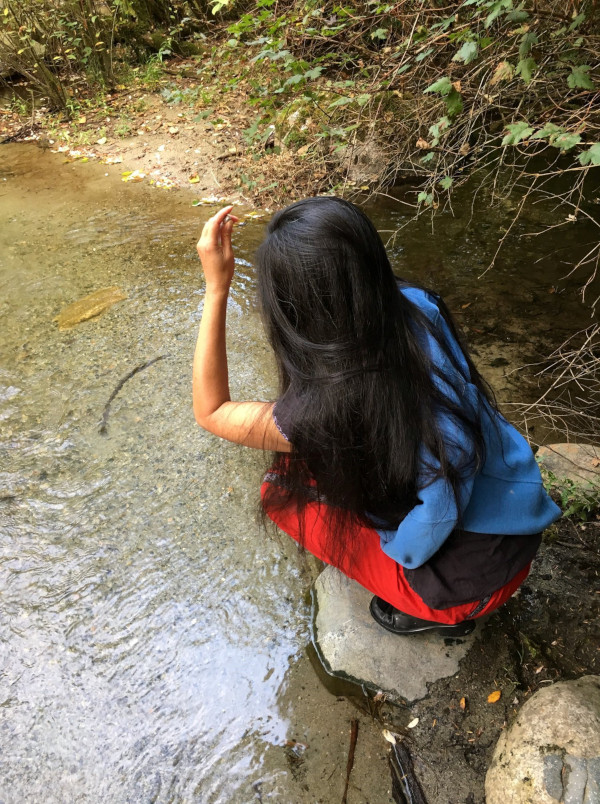
Almost every day in prison, I would take the time to sit outside, watch the trees and sing songs to thank the land. Gratitude, respect, and reciprocity with the land were what I decided to focus on while I was in prison. My body was restricted, but my heart, mind and spirit were free. One time, we smudged briefly in the prison, standing in a circle and singing the women warriors song, the bear song, and a song for the eagles. It was a quick ceremony before we had to get back to our unit for count and lockdown, but it reminded me of the healing walk for the tar sands that I participated in years ago.
In the first year of that healing walk through the brutal devastation wrought by Suncor and Syncrude near Fort McMurray, immersed in gross, carcinogenic air, somehow we saw a bear that day, and an eagle above us. The next year of the walk, the organizers made t-shirts for the healing walk with both the bear and the eagle on them, and I often wear this shirt to remind me what the healing walk has taught me. The bear and the eagle represent courage and love, both of which guide us when we honour our reciprocal relationships with the land and water.
I was released from Alouette Correctional Centre for Women after 18 days for good behaviour. I walked out with naloxone training, more mail than I’ve ever received in my life, and a renewed commitment to uphold natural and Indigenous laws. I went right back to Coast Salish Watch House at the perimeter of Trans Mountain’s tank farm, where I continue to be active with the Mountain Protectors working group.
People have asked me: What can I do? I say: Don’t give up.
Find creative ways to stop the pipeline expansion and turn it into a stranded asset.
Spend time with and protect sacred places like the Burrard Inlet, the Peace Valley, your local creeks and forests.
Our future depends on these acts of care and attention. Don’t look away from the violence that Trans Mountain is inflicting.
At the same time, keep an eye on the solutions we need to build together, the lifeboats that are in the making.
A poem written in my cell:
prison candy
what poverty, confinement & ingenuity produce—
a tasty brown taffy stretched
from packets of creamer, sugar, peanut butter
saved from dining hall meals
mixed & microwaved
set & shared by inmates
after count in Birch
Camp Cupcake isn’t as sweet as it sounds
lockdown is still lockdown
but sisterhood survives in it somehow
bright as a pink volleyball
bouncing off the sand
steady as a bear beyond the pines
chomping down on blackberries
in the prickly late summer bramble
quick as a dragonfly
riding the unseen breeze
that brushes across our cheeks ![]()
Read more: Energy, Rights + Justice, Environment



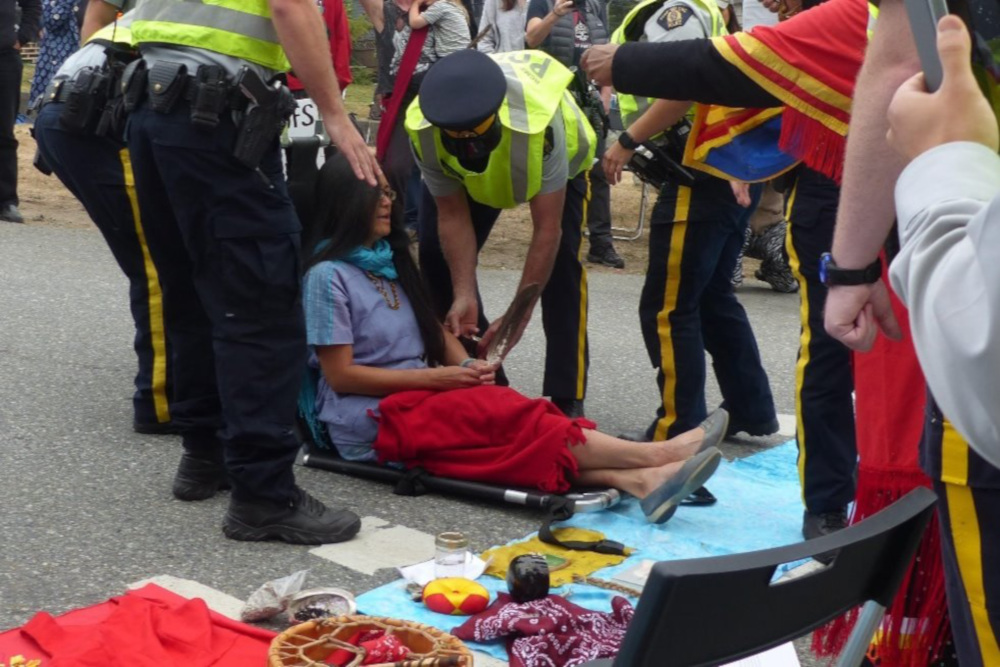












Tyee Commenting Guidelines
Comments that violate guidelines risk being deleted, and violations may result in a temporary or permanent user ban. Maintain the spirit of good conversation to stay in the discussion.
*Please note The Tyee is not a forum for spreading misinformation about COVID-19, denying its existence or minimizing its risk to public health.
Do:
Do not: